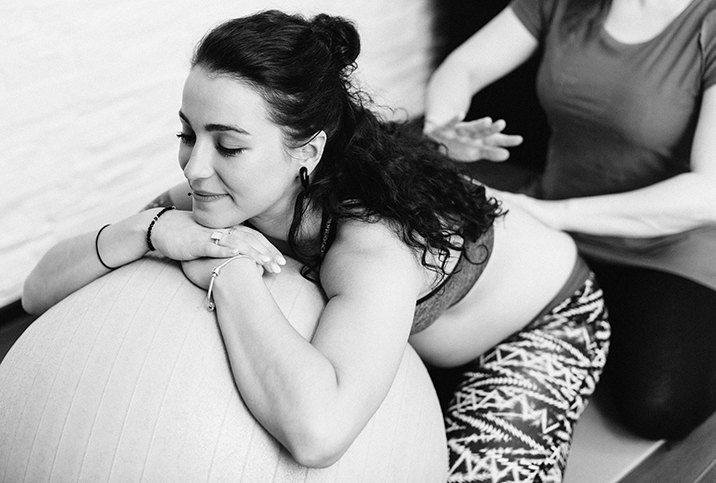Relaxation Techniques to Practice During Pregnancy

My earliest experience with pregnancy was "Full House" (what can I say? I'm a child of the '90s), which was perhaps not the greatest introduction to the world of human reproduction.
Here's what I thought pregnancy was: A woman's belly gets much bigger, she has sudden mood swings and strange cravings for hyper-specific foods, she takes childbirth classes in her living room with a bunch of other large-bellied women and John Stamos is by her side growing increasingly frustrated.
To be fair to "Full House," while the show muddied the waters of reproductive education, it did capture the emotional core of pregnancy. It's stressful.
It's stressful for women, whose bodies are literally making new life and experiencing hormonal fluctuations as their bodies adapt to motherhood—and it can also be stressful for their partners, who need to be supportive and patient, and who will likely get some things wrong.
Thankfully, resources and support are more accessible now than they've ever been, and maybe pregnancy doesn't have to be quite such a stressful time.
How stress affects the body
"Stress has a massive impact on the well-being of pregnant women and their children," said Monica Grover, D.O., head gynecologist at VSPOT sexual health spa.
"During pregnancy, the immune and nervous systems are working together to create a healthy and functional environment. Both systems are stimulated by stress and have the potential to change aspects of an offspring's development and quality of life," Grover explained. "Severe prenatal stress affects the development of your child's stress response in utero."
Grover identified just some of the potential negative effects of stress during pregnancy:
- Preterm labor
- Premature delivery
- Low infant birth weight independent of premature delivery
- Diabetes during pregnancy
Prenatal stress can also lead to an increase in postpartum depression, which can affect mother and child postpartum.
Not-so-healthy coping mechanisms for stress
Beyond just the effects of stress, it's important to acknowledge how some women may cope with the stress, as well. Some might enjoy a spa day or a hot tub, others might turn to a glass of wine to calm their nerves, but neither of these options is good for someone who's pregnant.
"Alcohol, including wine, has not been deemed safe for any term during pregnancy despite what some medical providers advise their patients," Grover said. "And saunas, steam rooms or hot tubs are not recommended because exposure to extreme heat can cause dehydration or hyperthermia that causes abnormalities in the fetus."
Not only is it important to find ways of reducing stress during pregnancy, but it's also important to ensure these methods are healthy for both you and your child.
Recommended coping mechanisms for stress
"Relaxation is important in pregnancy and in life," said Betsy Greenleaf, D.O., a board-certified urogynecologist. "It promotes processes that boost healthy hormones, reproduction and healing."
Greenleaf offered a list of de-stressors that could help pregnant women:
- Mindfulness activities
- Guided meditation
- Childbirth classes
- Support circles
- Cognitive behavioral therapy
- Safe physical activities, such as yoga
In fact, prenatal yoga functions as more than just a stress-reliever. Prenatal yoga shows benefits with sleep, pain relief, lessening nausea, shortness of breath and promoting the strength, flexibility and endurance of child-birthing muscles.
It should be noted, however, not all forms of yoga are beneficial for pregnant women, especially intense positions, such as backbends, twists, forward bends, contractions, inversions or anything that puts weight and pressure on your stomach.
Greenleaf also recommended a few apps that can help promote mindfulness and reduce stress:
- Daybreaker Plus focuses on activities that stimulate four important neurochemicals: dopamine, oxytocin, serotonin and endorphins
- Ziva Meditation for virtual meditation classes
- Mindvalley App for virtual courses on personal development, mindfulness and meditation
- Muse Headband, a headband that senses brain waves and works with an app to learn meditation through biofeedback
- Heart Math helps users learn to slow their heart rate and induce relaxation
Of course, there are thousands of other apps, websites and tutorials in addition to the ones Greenleaf provided.
Grover recommends ginger tea as a stress-reliever that can also help with nausea and digestive issues while boosting immunity.
"Be generous to yourself and get prenatal massages to help release tension, swelling and pain," Grover added. "Deep stretches release endorphins and keep your body healthy. Adding breathing exercises to your daily routine can improve your pregnancy experience astronomically. Breathing exercises increase your oxygen intake, help manage stress and have meditative benefits."
Think about the classic scene: A woman on the birthing table, sweating and stressed, screaming in pain in a hospital gown as a doctor updates her on the status of her baby, and her partner is holding her hand and saying, "Breathe, remember, breathe. In. Out. Now, push!"
Breathwork has numerous benefits, but it's especially useful in helping pregnant women maintain control during the painful process of childbirth, and practicing it early on in pregnancy helps the body become accustomed to patterned, controlled breathing, ultimately helping a woman to respond more positively to the pain.
In fact, there was even a scene in "Full House" where Becky practiced her controlled breathing in preparation for her delivery.
Still, don't use it as a tutorial.


















